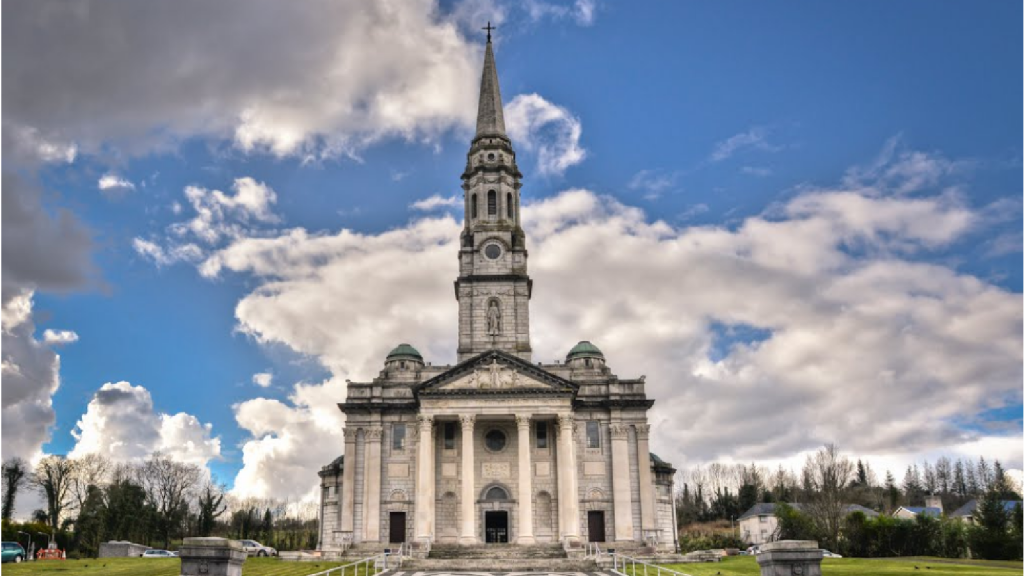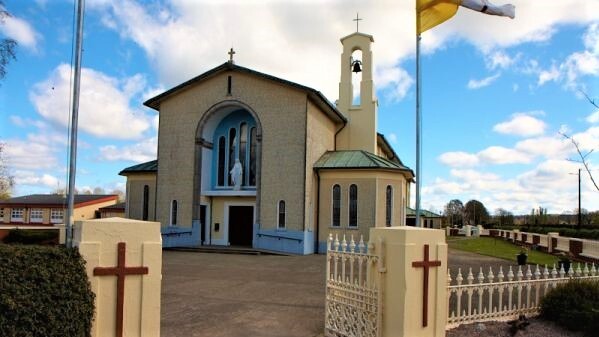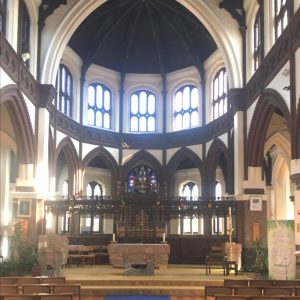Churches of the Day
Pictorial Thought for Today

Mar 5 - St Kieran of Saighir (6th cent.)
His mother came from Cape Clear in Co Cork, his father from Ossory. Kieran was one of the pre-Patrician saints of Ireland. Traditions say he went to Rome, was ordained by the Pope and was sent back to Ireland by Patrick. He is called 'the Elder' to distinguish him from St Ciarán of Clonmacnoise.
Patrick Duffy tells his story.
The Lives
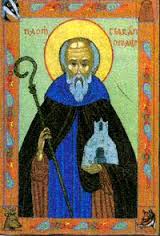 Kieran (Irish Ciarán) of Saighir is known as the "first-born of the saints of Ireland". Most of what we know about him comes from various Lives which were written down much later, so that while they are primarily intended to edify and entertain, it cannot either be concluded or excluded that the Lives reflect what actually happened.
Kieran (Irish Ciarán) of Saighir is known as the "first-born of the saints of Ireland". Most of what we know about him comes from various Lives which were written down much later, so that while they are primarily intended to edify and entertain, it cannot either be concluded or excluded that the Lives reflect what actually happened.Kieran, Ailbe, Declan and Ibar
In one of the Lives of Ciarán it is claimed that "before Patrick there were none to maintain faith and belief in Ireland but Kieran, Ailbe, Declan and bishop Ibar". These four were from the southern half of the country and this tradition may reflect faith interaction with Christians of south Wales before St Patrick came to Ireland.
Fostered on Cape Clear
Kieran's father belonged to the Osraighe. On a trip to the southwest of Ireland he met a woman called Liadán, who belonged to the Corca Loegde in southwest Cork. Kieran was born of their marriage and, according to the Lives, was fostered on Cape Clear, where there are many monuments dedicated to him.
Kieran coming back from Rome met St Patrick
Kieran set out for Rome, where he was baptised and studied scripture there "under the abbot of Rome". On his way back to Ireland it is said he met St Patrick, who told him exactly where to found his settlement, giving him a bell which would only ring when he found the place. This turned out to be Saighir Chiaráin, near the village of Clareen about four miles south-east of Birr, Co Offaly.
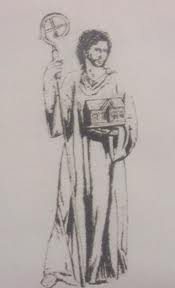 The animals his first monks
The animals his first monksLike John the Baptist, Kieran is a wilderness figure, dressed in the skins of wild animals. Another story is that he blessed a well so that "it had the taste of wine or honey for everyone who drank it got drunk as well as filled".
It is said that his mother Liadán came with some women and established a community at Saighir also.
Saighir Chiaráin
Saighir Chiaráin was the chief church of the Osraighe for some time. There is a monastic site with sacred well and the saint's bush still very popular at the place near Clareen in Co Offaly. For more see. However, ecclesiastically Seir Kieran seems to have been superseded by the later monastic foundation of St Canice at nearby Aghaboe. And it was Canice who was to be the patron of the church established by the Normans in the city of Kilkenny. This later became St Canice's cathedral in Irishtown, Kilkenny, presently held by the Anglican Church of Ireland.
 St Kieran's College, Kilkenny
St Kieran's College, KilkennyIn the twelfth century the Canons Regular of St Augustine were established at Saighir Kieran. After the penal times, in 1782, Bishop John Thomas Troy of Ossory (later archbishop of Dublin) established a Catholic diocesan seminary, St Kieran's College, in Kilkenny. The motto he gave it was: Hiems transiit, a quotation from the Song of Songs applied to the passing of the winter of the Penal Laws in Ireland. When the Catholic cathedral was built in 1843, although it was called St Mary’s, it also has Kieran as its secondary patron and Kieran is the patron saint of the Catholic diocese of Ossory.
____________________________________
******************************
Memorable Saying for Today
I believe we are here on the planet to live, grow up and do what we can to make the world a better place,
for all people to enjoy freedom
~ Rosa Parks ~
******************************
Thursday of the Second Week of Lent
The gospel story of the poor man Lazarus reminds us of the choice we have over our life and death.
Are we going to live and die, generously or selfishly?
Saint of the Day: Mar 5 - St Kieran of Saighir (6th cent.)
C/f A short life of be this saint can found below todays' Readings and Reflection
FIRST READING
A reading from the prophet Jeremiah 17:5-10
A curse on the one who puts his trust in man, a blessing on the one who puts his trust in the Lord.
The Lord says this:
'A curse on the man who puts his trust in man, who relies on things of flesh,
whose heart turns from the Lord.

He is like dry scrub in the wastelands: if good comes, he has no eyes for it, he settles in the parched places of the wilderness, a salt land, uninhabited. '
'A blessing on the man who puts his trust in the Lord, with the Lord for his hope. He is like a tree by the waterside that thrusts its roots to the stream: when the heat comes it feels no alarm, its foliage stays green; it has no worries in a year of drought, and never ceases to bear fruit.
'The heart is more devious than any other thing, perverse too: who can pierce its secrets? I, the Lord, search to the heart, I probe the loins, to give each man what his conduct and his actions deserve.'
The Word of the Lord. Thanks be to God
Responsorial Psalm Ps 1: 1-2,3, 4. 6 R/v Ps 39:5
Response Happy the man who has placed his trust in the Lord.
1. Happy indeed is the man who follows not the counsel of the wicked;

nor lingers in the way of sinners nor sits in the company of scorners,
but whose delight is the law of the Lord and who ponders his law day and night. Response
2. He is like a tree that is planted beside the flowing waters,
that yields its fruit in due season and whose leaves shall never fade;and all that he does shall prosper. Response
3. Not so are the wicked, not so!
For they like winnowed chaff shall be driven away by the wind.
For the Lord guards the way of the just but the way of the wicked leads to doom. Response
Gospel Acclamation Lk 15:18
Praise to you, O Christ, King of eternal glory!
I will leave this place and go to my father and say:
'Father, I have sinned against heaven and against you.'
Praise to you, O Christ, King of eternal glory!
Or Lk 15:18
Praise to you, O Christ, King of eternal glory!
Blessed are those who, with a noble and generous heart,
take the word of God to themselves and yield a harvest through their perseverance.
Praise to you, O Christ, King of eternal glory!
GOSPEL
The Lord be with you. And with your spirit
A reading from the holy Gospel according to Luke 16:19-31 Glory to you, O Lord
Good things came your way, bad things came the way of Lazarus. Now he is being comforted here while you are in agony.
Jesus said to the Pharisees:
'There was a rich man who used to dress in purple and fine linen and feast magnificently every day. And at his gate there lay a poor man called Lazarus, covered with sores, who longed to fill himself with the scraps that fell from the rich man's table. Dogs even came and licked his sores. Now the poor man died and was carried away by the angels to the bosom of Abraham. The rich man also died and was buried.
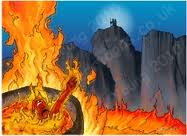 'In his torment in Hades he looked up and saw Abraham a long way off with Lazarus in his bosom.
'In his torment in Hades he looked up and saw Abraham a long way off with Lazarus in his bosom.So he cried out, "Father Abraham, pity me and send Lazarus to dip the tip of his finger in water and cool my tongue, for I am in agony in these flames".
"My son," Abraham replied "remember that during your life good things came your way, just as bad things came the way of Lazarus. Now he is being comforted here while you are in agony. But that is not all: between us and you a great gulf has been fixed, to stop anyone, if he wanted to, crossing from our side to yours, and to stop any crossing from your side to ours."
'The rich man replied,
"Father, I beg you then to send Lazarus to my father's house, since I have five brothers, to give them warning so that they do not come to this place of torment too".
"They have Moses and the prophets," said Abraham "let them listen to them."
"Ah no, father Abraham," said the rich man "but if someone comes to them from the dead, they will repent."
Then Abraham said to him, "If they will not listen either to Moses or to the prophets,
they will not be convinced even if someone should rise from the dead."'
The Gospel of the Lord. Praise to you, Lord Jesus Christ.
********************
Gospel Reflection Thursday, Second Week of Lent Luke 16:19-31
In the time of Jesus only a tiny number of people would have had the excessive wealth of the rich man in the parable. He is described as 'dressed in purple and fine linen, the most expensive cloth of the day. He feasted magnificently every day'. The vast bulk of the population in the place and time where Jesus lived never feasted at all. To feast magnificently every day is a vulgar display of wealth in that culture. In contrast to the rich man, Lazarus would have been a familiar figure to people.
There were many people who depended on the generosity of others to survive, which is why almsgiving was such an important value in the Jewish religion. Lazarus seems to have been extremely destitute. He had so little that he longed to eat the scraps that fell from the table of the rich man who lived just the other side of the gate. Yet, even though Lazarus was physically close to this extremely wealthy man, he was invisible to him. The rich man walked past Lazarus as if he wasn’t there. However, Lazarus was not invisible to God.
When Lazarus died he received the hospitality that was denied him in this life. He was given a place of honour beside Abraham at the banquet of eternal life. The rich man had the opportunity to reveal something of God’s hospitality to Lazarus before Lazarus died but he failed to do so. We are all called to reveal something of God’s hospitable and welcoming love to each other in the here and now. Individuals and whole groups whose need is great can become invisible to us. They may be physically near us, but we don’t see them. It is the Lord who calls out to us through those in greatest need, just as God was calling out to the rich man through Lazarus. Whenever we become present to them in a way that reveals God’s love we are doing God’s good work on earth. We are like that tree, mentioned in the first reading, whose ‘foliage stays green… and never ceases to bear fruit’. In revealing God’s hospitable love to those who are at risk of becoming invisible, we open ourselves up to receiving God’s hospitable love both in this life and in eternal life. As Jesus says elsewhere in the gospels, ‘Give and there will be gifts for you’.
______________________________________
The Scripture Readings are taken from The Jerusalem Bible, published 1966 by Darton, Longman & Todd Ltd. and used with the permission of the publishers. http://dltbooks.com/
The Scripture Reflection is made available with our thanks from his book Reflections on the Weekday Readings : The Word is near to you, on your lips and in your heart by Martin Hogan and published by Messenger Publications c/f www.messenger.ie/bookshop/
_________________________
Saint of the Day: Mar 5 - St Kieran of Saighir (6th cent.)
Kieran was a wilderness man, (a lover of nature!) His mother came from Cape Clear in Co Cork, his father from Ossory. Kieran was one of the pre-Patrician saints of Ireland. Traditions say he went to Rome, was ordained by the Pope and was sent back to Ireland by Patrick. (He is called 'the Elder' to distinguish him from St Ciarán of Clonmacnoise.)
Patrick Duffy tells his story.
The 'Lives'
 Kieran (Irish Ciarán) of Saighir is known as the "first-born of the saints of Ireland". Most of what we know about him comes from various 'Lives' which were written down much later, so that while they are primarily intended to edify and entertain, it cannot either be concluded or excluded that the 'Lives' reflect what actually happened.
Kieran (Irish Ciarán) of Saighir is known as the "first-born of the saints of Ireland". Most of what we know about him comes from various 'Lives' which were written down much later, so that while they are primarily intended to edify and entertain, it cannot either be concluded or excluded that the 'Lives' reflect what actually happened.Kieran, Ailbe, Declan and Ibar
In one of the Lives of Ciarán it is claimed that "before Patrick there were none to maintain faith and belief in Ireland but Kieran, Ailbe, Declan and bishop Ibar".
These four were from the southern half of the country and this tradition may reflect faith interaction with Christians of south Wales before St Patrick came to Ireland.
Fostered on Cape Clear
Kieran's father belonged to the Osraighe. On a trip to the southwest of Ireland he met a woman called Liadán, who belonged to the Corca Loegde in southwest Cork. Kieran was born of their marriage and, according to the Lives, was fostered on Cape Clear, where there are many monuments dedicated to him.
Kieran coming back from Rome met St Patrick
Kieran set out for Rome, where he was baptised and studied scripture there "under the abbot of Rome". On his way back to Ireland it is said he met St Patrick, who told him exactly where to found his settlement, giving him a bell which would only ring when he found the place. This turned out to be Saighir Chiaráin, near the village of Clareen about four miles south-east of Birr, Co Offaly.
 The animals were his first monks
The animals were his first monksLike John the Baptist, Kieran is a wilderness figure, dressed in the skins of wild animals. Another story is that he blessed a well so that "it had the taste of wine or honey for everyone who drank it got drunk as well as filled".
It is said that his mother Liadán came with some women and established a community at Saighir also.
Saighir Chiaráin
Saighir Chiaráin was the chief church of the Osraighe for some time. There is a monastic site with sacred well and the saint's bush still very popular at the place near Clareen in Co Offaly. For more see. However, ecclesiastically Seir Kieran seems to have been superseded by the later monastic foundation of St Canice at nearby Aghaboe. And it was Canice who was to be the patron of the church established by the Normans in the city of Kilkenny. This later became St Canice's cathedral in Irishtown, Kilkenny, presently held by the Anglican Church of Ireland.
 St Kieran's College, Kilkenny
St Kieran's College, KilkennyIn the twelfth century the Canons Regular of St Augustine were established at Saighir Kieran. After the penal times, in 1782, Bishop John Thomas Troy of Ossory (later archbishop of Dublin) established a Catholic diocesan seminary, St Kieran's College, in Kilkenny. The motto he gave it was: Hiems transiit, (Winter passes) a quotation from the Song of Songs applied to the passing of the winter of the Penal Laws in Ireland. When the Catholic cathedral was built in 1843, although it was called St Mary’s, it also has Kieran as its secondary patron and he is also the patron saint of the Catholic diocese of Ossory.
******************************
Memorable Saying for Today
I believe we are here on the planet to live, grow up,
and do what we can to make the world a better place, for all people to enjoy freedom
~ Rosa Parks ~
******************************
Sliocht as Leabhar Irimia, Fáidh. 17:5-10
Is mallaithe an fear a chuireann a mhuinín i nduine, is beannaithe an duine a chuireann a mhuinín sa Tiarna.
Is mar seo a deir an Tiarna:
“Is mallaithe an fear a chuireann a mhuinín i nduine, agus a bhíonn i dtuilleamaí na feola,
agus a iompaíonn a chroí ón Tiarna.

Is cosúil é le grágán tóir san fhásach; má thagann maith ní fheiceann sé í;
cuireann sé faoi in áiteanna dóite an fhásaigh, i bhfearann saillte atá gan áitreabh.
Is beannaithe an fear a chuireann a mhuinín sa Tiarna agus arb é an Tiarna a dhóchas.
Is cosúil é le crann atá lámh le huisce, agus a shíneann a fhréamhacha amach leis an sruth;
ní bhíonn sé i bhfaitíos roimh lá an bhrothaill, mar fanann a dhuilliúr glas;
ní bhíonn sé buartha i mbliain an tarta, mar ní éiríonn as torthaí a thabhairt.
Tá an croí cealgach thar gach rud eile, agus urchóideach lena chois;
cé a fhéadann é a ransú? Mise, an Tiarna, scrúdaím an croí, dearbhaím na duáin, a thabhairt do gach aon fhear de réir a iompair agus de réir toradh a ghníomhartha.
Briathar an Tiarna Buíochas le Dia
Salm le Freagra Sm 1: : 1-2,3, 4. 6 R/v Sm 39:5
Freagra Is aoibhinn don té a chuireann a dhóchas sa Tiarna.
1. Is aoibhinn don fhear nach leanann de chomhairle lucht na héagráifeachta;
nach seasann i slí na bpeacach, agus nach suíonn i gcuideachta na sotalach;

ach a bhfuil a dhúil i ndlí an Tiarna, agus a dhéanann machnamh air de lá agus d’oíche. Freagra
2. Is cosúil an duine sin le crann a plandaíodh ar bhruach na habhann,
a thugann a thoradh go tráthúil agus nach bhfeonn a dhuilleoga choíche.
Bíonn an rath ar gach aon ní dá ndéanann sé. Freagra
3. Ní amhlaidh do na héagráifigh, ní amhlaidh! ach mar cháith a scaiptear le gaoth.
Óir is cúram don Tiarna slí na bhfíréan, ach rachaidh slí na n-éagráifeach ar ceal. Freagra
SOISCÉAL
Go raibh an Tiarna libh. Agus le do spiorad féin
Sliocht as an Soiscéal naofa de réir Naomh Lúcás 16: 1-6. 19-31 Glóir duit, a Thiarna
Fuair tusa do chuid féin de na dea-nithe le linn do bheatha, agus mar an gcéanna go bhfuair Lazaras na drochnithe. Ach anois tá seisean á shólású abhus, agus tusa do do chrá.
San am sin dúirt Íosa leis na fairisínigh:
“Bhí fear saibhir ann a mbíodh corcra agus sról rómhín mar éadach air, agus é go taibhseach gach lá ag bord aoibhinn. Agus bhíodh duine bocht darbh ainm Lazaras ina luí le hais a gheata agus screamh othras air agus arbh é ba mhian leis a shá a fháil den sprúilleach a thiteadh ó bhord an fhir shaibhir; agus fós, bhíodh na gadhair féin ag teacht ag lí na n-othras aige. Ach ansin fuair an duine bocht bás, agus iompraíodh ag na haingil é go hucht Abrahám. Fuair an fear saibhir bás freisin agus adhlacadh é.
 Agus in ifreann dó, d’ardaigh sé a shúile agus é i bpiolóidí, agus chonaic Abrahám i bhfad uaidh agus Lazaras ina ucht. Agus ghlaoigh sé amach:
Agus in ifreann dó, d’ardaigh sé a shúile agus é i bpiolóidí, agus chonaic Abrahám i bhfad uaidh agus Lazaras ina ucht. Agus ghlaoigh sé amach:‘A athair Abrahám,’ ar sé, ‘bíodh trua agat dom, agus cuir Lazaras go dtomfadh sé barr a mhéire in uisce agus go bhfuaródh mo theanga, óir táim do mo chrá sa lasair seo.’
Ach dúirt Abrahám:
‘Cuimhnigh, a mhic, go bhfuair tusa do chuid féin de na dea-nithe le linn do bheatha, agus mar an gcéanna go bhfuair Lazaras na drochnithe.
Ach anois tá seisean á shólású abhus, agus tusa do do chrá. Agus ina éagmais sin uile, tá duibheagán mór suite daingean idir sinne agus sibh,ionas nach féidir leo seo arb áil leo é dul anonn chugaibh agus nach ngabhtar anall trasna chugainne.’
Dúirt seisean:
‘Iarraim ort más ea, a athair, é chur go dtí teach m’athar –óir tá cúigear dearthár agam –
chun go dtabharfadh sé fios an scéil dóibh d’eagla go dtiocfaidís sin freisin san áit seo na bpiolóidí.’
Dúirt Abrahám: ‘Tá Maois acu agus na fáithe; éistidís leo sin.’
Dúirt sé: ‘Ní hea, a athair Abrahám, ach má théann duine ó na mairbh chucu déanfaidh siad aithrí.’.
Ach dúirt sé leis:
‘Mura n-éisteann siad le Maois agus leis na fáithe, ní mó a ghéillfidh siad má éiríonn duine ó mhairbh.’
Soiscéal an Tiarna. Moladh duit, a Chriost
AN BÍOBLA NAOFA
© An Sagart
Third Sunday of Lent, Year A
Through the Spirit of God the gift of love is poured into our hearts, a gift bought by the blood of Christ.
This is true for all Christians, new and old. But it needs to be constantly prayed for.
First Scrutiny of Catechumens is celebrated today
FIRST READING
A reading from the Book of Exodus 17:3-7
Give us water to drink.
 Tormented by thirst, the people complained against Moses. 'Why did you bring us out of Egypt?' they said. 'Was it so that I should die of thirst, my children too, and my cattle?' Moses appealed to the Lord. 'How am I to deal with this people? he said. 'A little more and they will stone me!'
Tormented by thirst, the people complained against Moses. 'Why did you bring us out of Egypt?' they said. 'Was it so that I should die of thirst, my children too, and my cattle?' Moses appealed to the Lord. 'How am I to deal with this people? he said. 'A little more and they will stone me!'The Lord said to Moses,
'Take with you some of the elders of Israel and move on to the forefront of the people; take in your hand the staff with which you struck the river, and go. I shall be standing before you there on the rock, at Horeb. You must strike the rock, and water will flow from it for the people to drink.'
This is what Moses did, in the sight of the elders of Israel. The place was named Massah and Meribah because of the grumbling of the sons of Israel and because they put the Lord to the test by saying, 'Is the Lord with us, or not?'
The Word of the Lord Thanks be to God.
Responsorual Psalm Ps 94:1-2, 6-9, R/v8
Response O that today you would listen to his voice,
harden not your hearts.
1. Come, ring out our joy to the Lord; hail the rock who saves us.
Let us come before him, giving thanks, with songs let us hail the Lord. Response
2. Come in; let us bow and bend low; let us kneel before the God who made us
for he is our God and we the people who belong to his pasture,
the flock that is led by his hand. Response
3. O that today you would listen to his voice! 'Harden not your hearts as at Meribah,
as on that day at Massah in the desert when your fathers put me to the test;
when they tried me, though they saw my work.' Response
SECOND READING
A reading from the first letter of St Paul to the Romans 5:1-2. 5-8
The love of God has been poured into our hearts by the Holy Spirit which has been given us.
 Through our Lord Jesus Christ, by faith we are judged righteous and at peace with God, since it is by faith and through Jesus that we have entered this state of grace in which we can boast about looking forward to God's glory and this hope is not deceptive, because the love of God has been poured into our hearts by the Holy Spirit which has been given us. We were still helpless when at his appointed moment Christ died for sinful men. It is not easy to die even for a good man - though of course for someone really worthy, a man might be prepared to die - but what proves that God loves us is that Christ died for us while we were still sinners.
Through our Lord Jesus Christ, by faith we are judged righteous and at peace with God, since it is by faith and through Jesus that we have entered this state of grace in which we can boast about looking forward to God's glory and this hope is not deceptive, because the love of God has been poured into our hearts by the Holy Spirit which has been given us. We were still helpless when at his appointed moment Christ died for sinful men. It is not easy to die even for a good man - though of course for someone really worthy, a man might be prepared to die - but what proves that God loves us is that Christ died for us while we were still sinners.The Word of the Lord Thanks be to God.
Gospel Acclamation Jn 4: 42.15
Glory and praise to you, O Christ !
Lord, you are really the saviour of the world;
give me the living water, so that I may never get thirsty.
Glory and praise to you, O Christ !
GOSPEL
The Lord be with you. And with your spirit
A reading from the Gospel according to John 4:5-42 Glory to you, O Lord
A spring inside him, welling up to eternal life'
Jesus came to the Samaritan town called Sychar, near the land that Jacob gave to his son Joseph. Jacob's well is there and Jesus, tired by the journey, sat straight down by the well. It was about the sixth hour When a Samaritan woman came to draw water,
Jesus said to her, 'Give me a drink'.
His disciples had gone into the town to buy food. The Samaritan woman said to him,
'What? You are a Jew and you ask me, a Samaritan, for a drink?' - Jews, in fact, do not associate with Samaritans.
Jesus replied:
 If you only knew what God is offering and who it is that is saying to you: Give me a drink, you would have been the one to ask, and he would have given you living water'.
If you only knew what God is offering and who it is that is saying to you: Give me a drink, you would have been the one to ask, and he would have given you living water'.'You have no bucket, sir,' she answered 'and the well is deep: how could you get this living water? Are you a greater man than our father Jacob who gave us this well and drank from it himself with his sons and his cattle?'
Jesus replied 'Whoever drinks this water will get thirsty again;
but anyone who drinks the water that I shall give will never be thirsty again: the water that I shall give will turn into a spring inside him, welling up to eternal life'.
'Sir,' said the woman 'give me some of that water, so that I may never get thirsty and never have to come here again to draw water.'
'Go and call your husband' said Jesus to her 'and come back here.'
The woman answered, 'I have no husband'.
He said to her, You are right to say, "I have no husband"; for although you have had five, the one you have now is not your husband. You spoke the truth there.'
'I see you are a prophet, sir' said the woman.
'Our fathers worshipped on this mountain, while you say that Jerusalem is the place where one ought to worship.'
Jesus said: 'Believe me, woman, the hour is coming when you will worship the Father neither on this mountain nor in Jerusalem. You worship what you do not know; we worship what we do know: for salvation comes from the Jews.
But the hour will come - in fact it is here already – when true worshippers will worship the Father in spirit and truth: that is the kind of worshipper the Father wants. God is spirit, and those who worship must worship in spirit and truth.'
The woman said to him, 'I know that Messiah - that is, Christ - is coming; and when he comes he will tell us everything'.
'I who am speaking to you,' said Jesus 'I am he.'
At this point his disciples returned, and were surprised to find him speaking to a woman, though none of them asked, 'What do you want from her?' or, 'Why are you talking to her?'
The woman put down her water jar and hurried back to the town to tell the people.
'Come and see a man who has told me everything I ever did; I wonder if he is the Christ?' This brought people out of the town and they started walking towards him.
Meanwhile, the disciples were urging him, 'Rabbi, do have something to eat; but he said,
'I have food to eat that you do not know about'.
So the disciples asked one another, 'Has someone been bringing him food?'
But Jesus said: 'My food is to do the will of the one who sent me, and to complete his work.
Have you not got a saying: 'Four months and then the harvest?'
Well, I tell you: Look around you, look at the fields; already they are white, ready for harvest!
Already the reaper is being paid his wages, already he is bringing in the grain for eternal life,
and thus sower and reaper rejoice together.
For here the proverb holds good: one sows, another reaps; I sent you to reap a harvest you had not worked for. Others worked for it; and you have come into the rewards of their trouble.'
Many Samaritans of that town had believed in him on the strength of the woman's testimony when she said, 'He told me all I have ever done', so, when the Samaritans came up to him, they begged him to stay with them. He stayed for two days, and when he spoke to them many more came to believe; and they said to the woman, 'Now we no longer believe because of what you told us; we have heard him ourselves and we know that he really is the saviour of the world'.
The Gospel of the Lord Praise to you, Lord Jesus Christ.
*****************************
For homily resources for this Sunday's Gospel click here: https://www.catholicireland.net/sunday-homily/
The scripture readings are taken from THE JERUSALEM BIBLE, published in 1966 by Darton, Longman and Todd Ltd and used with permission of the publishers.
Sliocht as Leabhar Exodus 17:3-7
Tabhair dúinn uisce le hól.
 Bhí íota tarta ar an bpobal agus rinneadar monabhar in aghaidh Mhaois.
Bhí íota tarta ar an bpobal agus rinneadar monabhar in aghaidh Mhaois.“Cad chuige ar thug tú amach as an Éigipt sinn?” ar siad.
“An d’fhonn go gcuirfeá sinn féin agus ár gclann agus ár stoc chun báis le tart?”
Ghlaoigh Maois ar an Tiarna: “Cad a dhéanfaidh mé leis an bpobal seo? Is beag nach bhfuil siad ag gabháil de chlocha ionam.”
Agus dúirt an Tiarna le Maois:
“Tabhair leat cuid de sheanóirí Iosrael agus téigh ar thosach an phobail. Beir i do láimh ar an tslat lenar bhuail tú an abhainn, agus seo leat. Féach! beidh mé i mo sheasamh ansiúd ar an gcarraig romhat (i Horaeb). Buail an charraig agus snífidh uisce aisti le hól ag an bpobal.”
Agus rinne Maois amhlaidh i láthair sheanóirí Iosrael. Thug sé Masá agus Miríbeá ar an áit de bharr chasaoid chlann Iosrael agus go ndearnadar promhadh ar an Tiarna á rá: “An bhfuil an Tiarna farainn nó nach bhfuil?”
Briathar an Tiarna Buíochas le Dia
Salm le Freagra Sm 94:1-2, 6-9, R/v8
Freagra Á, dá n-éistfeadh sibh lena ghuth inniu: 'Ná calcaigí bhur gcroí.'
1. Tagaigí, déanaimis gairdeas don Tiarna, tógaimis gártha áthais do Charraig ár slánaithe.
Tagaimis ina láthair le moltaí, déanaimis gairdeas dó le laoithe. Freagra
2. Tagaigí, adhraimis agus sléachtaimis, feacaimis ár nglúine don Tiarna a rinne sinn.
Óir is é ár nDia é, agus is sinne pobal a aoireachta agus caoirigh a lámh. Freagra
3. Á, dá n-éistfeadh sibh lena ghuth inniu: 'Na calcaigí bhur gcroí mar a tharla i Meríba,
mar a tharla an lá úd ag Masá san fhásach mar ar chuir bhur n-aithreacha cath orm,
mar ar thriail siad mé cé go bhfaca siad m'obair.' Freagra
DARA LÉACHT
Sliocht as Litir Naomh Pól chuig na Rómhánaigh 5:1-2. 5-8
Tá ár gcroí líonta de ghrá Dé tríd an Spiorad Naomh a tugadh dúinn
 Dá bhrí sin, ó táimid fíréanaithe ag an gcreideamh, tá síocháin againn le Dia trínár dTiarna Íosa Críost, mar is trídsean atá teacht againn le creideamh ar an ngrásta seo ina mairimid. Agus ábhar mórála dúinn is ea an dóchas go bhfuil glóir Dé i ndán dúinn. Agus ní amháin sin ach is ábhar mórála dúinn ár dtrioblóidí agus a fhios againn go dtagann foighne ón trioblóid, agus diongbháilteacht ón bhfoighne agus dóchas ón diongbháilteacht. Ní chliseann an dóchas seo orainn mar tá ár gcroí líonta de ghrá Dé tríd an Spiorad Naomh a tugadh dúinn. Nuair a bhíomar fós lag, fuair Críost bás i dtráth ar son drochdhaoine. Is ar éigean a gheobhadh fear bás ar son duine chóir féin – is ea, b’fhéidir go mbeadh sé de chroí aige bás a fháil ar son dea-dhuine. Ach cruthaíonn Dia an grá atá aige dúinn trí Chríost a fháil bháis ar ár son agus sinn fós inár bpeacaigh.
Dá bhrí sin, ó táimid fíréanaithe ag an gcreideamh, tá síocháin againn le Dia trínár dTiarna Íosa Críost, mar is trídsean atá teacht againn le creideamh ar an ngrásta seo ina mairimid. Agus ábhar mórála dúinn is ea an dóchas go bhfuil glóir Dé i ndán dúinn. Agus ní amháin sin ach is ábhar mórála dúinn ár dtrioblóidí agus a fhios againn go dtagann foighne ón trioblóid, agus diongbháilteacht ón bhfoighne agus dóchas ón diongbháilteacht. Ní chliseann an dóchas seo orainn mar tá ár gcroí líonta de ghrá Dé tríd an Spiorad Naomh a tugadh dúinn. Nuair a bhíomar fós lag, fuair Críost bás i dtráth ar son drochdhaoine. Is ar éigean a gheobhadh fear bás ar son duine chóir féin – is ea, b’fhéidir go mbeadh sé de chroí aige bás a fháil ar son dea-dhuine. Ach cruthaíonn Dia an grá atá aige dúinn trí Chríost a fháil bháis ar ár son agus sinn fós inár bpeacaigh.Briathar an Tiarna Buíochas le Dia
Comhghair an tSoisceil Eo 4:42, 15
A Thiarna, is tú dáiríre Slánaitheoir an tsaoil;
tabhair dom on t-uisce beo i dtreo nach mbeidh tart orm choíche.
SOISCÉAL
Sliocht as Soiscéal naofa de réir Naomh Eoin 4:5-42
Tobar uisce ag brúchtail chun na beatha síoraí.
San am sin tháinig Íosa mar sin go cathair sa tSamáir darbh ainm Suchar, láimh leis an bhfearann a thug Iacób dá mhac Iósaef. Ansiúd a bhí tobar Iacóib. Mar go raibh Íosa traochta ón aistear, shuigh sé ag an tobar. Timpeall an séú huair a ba ea é. Tháinig bean ón tSamáir ag tarraingt uisce.
Dúirt Íosa léi: “Tabhair dom deoch.” Bhí a dheisceabail imithe isteach don chathair ag ceannach bia. Dúirt an Samárach mná leis ansin: “Conas go n-iarrann tusa, agus gur Giúdach thú, deoch ormsa agus gur Samárach mná mé?” Ní bhíonn aon chaidreamh ag Giúdaigh ar Shamáraigh.

D’fhreagair Íosa: “Dá mba eol duit tabhartas Dé,” ar sé léi,“agus cé hé a deir leat:
‘ Tabhair dom deoch,’ is tusa a bheadh ag iarraidh airsean, agus thabharfadh sé duit uisce beo.”
“Níl aon bhuicéad agat, a dhuine uasail,” arsa an bhean leis, “agus tá an tobar domhain. Cad as mar sin a gheobhfá an t-uisce beo seo? An amhlaidh gur mó thú ná ár n-athair Iacób a thug dúinn an tobar agus gur ól sé féin as agus a chlann agus a thréada?”
D’fhreagair Íosa:
“Gach duine a ólann an t-uisce seo,” ar sé léi, “beidh tart arís air. Ach má olann aon duine an t-uisce a thabharfaidh mise dó, ní bheidh tart air go brách na breithe. Ach an t-uisce a thabharfaidh mise dó, déanfaidh tobar uisce de istigh ann, ag brúchtaíl chun na beathn síoraí.”
Dúirt an bhean leis:
“A dhuine uasail, tabhair dom an t-uisce sin i dtreo nach mbeidh tart orm choíche, agus nach gcaithfidh mé teacht anseo ag tarraingt uisce.”
Dúirt sé léi: “Imigh agus glaoigh ar d’fhear agus fill anseo.”
D’fhreagair an bhean: “Níl fear agam,”
Dúirt Íosa léi: “Is maith a dúirt tú: ‘Níl fear agam’; óir bhí cúigear fear agat agus an té atá anois agat ní hé d’fhear é. D’inis tú an fhírinne sa mhéid sin.”
Dúirt an bhean leis: “A dhuine uasail, feicim gur fáidh thú. Ar an gcnoc seo a rinne ár n-aithreacha Dia a adhradh, ach deir sibhse gur in Iarúsailéim atá an áit in ar cóir adhradh a dhéanamh.”
Dúirt Íosa léi: “Creid uaimse é, a bhean go bhfuil an uain ag teacht nuair nach ar an gcnoc seo ná in Iarúsailéim a dhéanfaidh sibh an tAthair a adhradh. Adhrann sibhse an ní nach eol daoibh; adhraimidne an ní is eol dúinn; mar is ó na Giúdaigh an slánú.
Ach tá an uain ag teacht, agus is anois féin é, ina ndéanfaidh lucht an fhíoradhartha an tAthair a adhradh sa Spiorad agus san fhírinne; óir sin iad an sórt is mian leis an Athair á adhradh. Spiorad é Dia, agus lucht a adhartha is i spiorad agus i bhfírinne a chaithfidh siad adhradh.”
Dúirt an bhean leis: “Tá a fhios agam go bhfuil an Meisias ag teacht” – is é sin le rá an Críost – “agus nuair a thiocfaidh seisean inseoidh sé gach aon ní dúinn.”
Dúirt Íosa léi: “Mise é atá ag caint leat.”
Lena linn sin tháinig a dheisceabail agus rinne siad ionadh de go raibh sé ag caint le bean. Ní dúirt aon duine acu, áfach: “Cad tá uait?” ná “Cén fáth tú a bheith ag caint léi?”
Lig an bhean a crúsca uaithi ansin agus d’imigh léi isteach don chathair agus dúirt leis na daoine:
“Tagaigí go bhfeicfidh sibh fear a d’inis dom gach ní dá ndearna mé. An féidir gurb é an Criost é?”
Ghluais deoine amach as an gcathair agus bhí siad ag dul ina threo.
Lena linn sin bhí a dheisceabail ag tathant air: “A raibí,” ar siad leis, “bí ag ithe.”
Dúirt sé leo: “Tá agam bia le hithe nach eol daoibhse.”
Ansin dúirt na deisceabail lena chéile: “An féidir gur thug duine éigin rud le hithe dó?”
Dúirt Íosa leo “Is é is bia domsa toil an té a chuir uaidh mé a dhéanamh agus a obair a chur i gcrích.
Nach ndeir sibhse ‘Ceithre mhí eile agus beidh an fómhar ann’?
Seo mise á rá libh: Tógaigí bhur súile agus féachaigí ar na goirt; tá siad geal chun an fhómhair.
Tá a thuarastal á fháil ag an mbuanaí cheana féin, agus tá toradh á bhailiú aige chun na beatha síoraí, i dtreo go bhfuil lúcháir ar an síoladóir agus ar an mbuanaí in éineacht.
Óir is fíor don seanfhocal sa mhéid seo: ‘ Cuireann duine, baineann duine eile.’ Sheol mise sibhse uaim chun fómhar a bhaint nár shaothraigh sibh féin. Shaothraigh daoine eile é, agus chuaigh sibhse isteach ina saothar.”
Chreid a lán de Shamáraigh na cathrach sin ann de bharr fhocal na mná ag tabhairt na fianaise: “D’inis sé dom gach ní dá ndearna mé.”
Nuair a tháinig na Samáraigh chuige dá bhrí sin bhí siad ag tathant air fanacht faróthu, agus d’fhan sé ansiúd dhá lá. Ba mhó go mór a chreid de bharr a bhriathair agus deiridís leis an mbean:
“Ní mar gheall ar do chuid cainte a chreidimid a thuilleadh; óir chualamar féin é agus tá a fhios againn gurb é seo dáiríre Slánaitheoir an domhain.”
Soiscéal an Tiarna. Moladh duit, a Chriost
AN BÍOBLA NAOFA
© An Sagart


